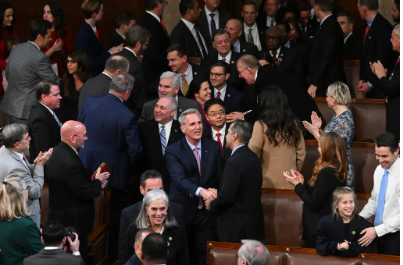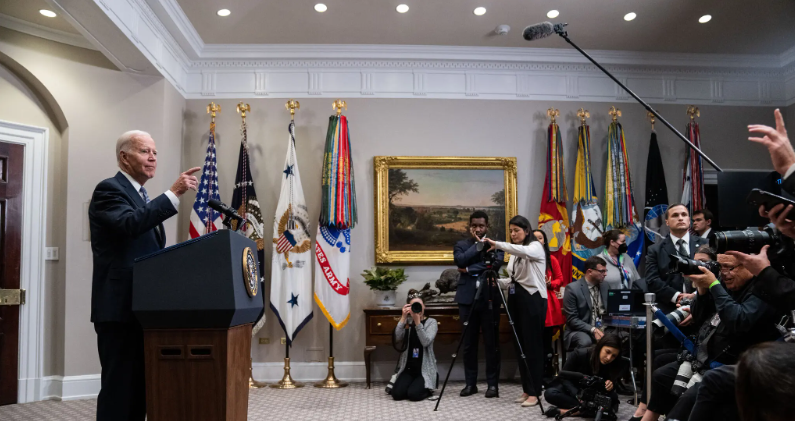-
Posts
3,840 -
Joined
-
Last visited
-
Days Won
119
richardmurray's Achievements
Single Status Update
See all updates by richardmurray
-

Speaker Kevin McCarthy said this week that Republicans would use their leverage, including the need to raise the U.S. debt limit later this year, to corral spending.Credit...Kenny Holston/The New York TimesU.S. Deficit Fell to $1.4 Trillion in 2022
The deficit was down from $2.6 trillion a year earlier, as pandemic emergency spending slowed, the economy reopened and tax revenue rose. The new figures come as spending fights loom in a divided Congress.By Alan Rappeport and Jim Tankersley
Jan. 12, 2023
WASHINGTON — The federal budget deficit fell to $1.4 trillion for the 2022 calendar year, down from $2.6 trillion a year ago, as pandemic emergency spending slowed, the economy reopened and tax revenue rose, according to the Treasury Department.While the annual gap between what the nation spends and what it takes in narrowed, the monthly deficit for December 2022 widened compared with a year ago, suggesting that the deficit will most likely grow again in the year to come. The federal government recorded an $85 billion shortfall last month, up from a $21 billion deficit in December 2021.
The figures released on Thursday come at a moment of heightened attention on the nation’s finances, with Republicans, who now control the House, pledging to push for deep spending cuts and slash the national debt. Despite the smaller annual shortfall, America’s long-term fiscal picture has darkened somewhat in the last year. The national debt topped $31 trillion for the first time in 2022 and interest rates are rising, increasing the amount of money the United States must pay to investors who buy its debt.
Net interest costs have risen by 41 percent over the past calendar year, the data showed. The Peterson Foundation, which advocates debt reduction, reported on Thursday that the jump was larger than the biggest increase in interest costs in any single fiscal year, dating back to 1962.
Republicans have said repeatedly that they will make balancing the federal budget over the course of a decade and reducing the national debt a central focus of their economic agenda this year. They say large deficits under President Biden have contributed to high inflation, which hit a 40-year peak last summer but has eased in recent months. The Labor Department reported on Thursday that prices receded slightly in December.
Speaker Kevin McCarthy said this week that Republicans would use their leverage, including the need to raise the country’s debt limit this year, to corral spending.
“One of the greatest threats we have to this nation is our debt,” Mr. McCarthy said on Fox News. “It makes us weak in every place that we can.”
But Republicans have also prioritized policies this month that would add to deficits. The House passed legislation this week that would rescind much of the $80 billion that was allocated to the Internal Revenue Service last year to beef up its enforcement capacity. The nonpartisan Congressional Budget Office said that the Republican bill to cut the money would actually increase the deficit by $114 billion through 2032.
Mr. Biden said on Thursday that he would veto such legislation and assailed Republicans for backing a measure that would add to the deficit and make it easier for the wealthy to cheat on their taxes by cutting the I.R.S. enforcement budget. He has repeatedly said he will not negotiate with Republicans on the debt ceiling and will insist that lawmakers raise the limit with no strings attached.
“I was disappointed that the very first bill the Republicans in the House of Representatives passed would help wealthy people and big corporations cheat on their taxes at the expense of ordinary, middle-class taxpayers,” Mr. Biden told reporters at the end of remarks about inflation and the economy. “And it would add $114 billion to the deficit. Their very first bill.”
The president and his aides have said he is open to working with Republicans to reduce the deficit by raising taxes on high earners and corporations — proposals that Republican lawmakers have roundly rejected.
Budget watchdog groups that advocate fiscal restraint have called on lawmakers to enact policies that will stabilize the debt.
“We should not be borrowing $4 billion a day, an apparent debt addiction that is harmful to the economy and the budget,” said Maya MacGuineas, the president of the Committee for a Responsible Federal Budget. “We hear a lot of talk about fiscal responsibility, but very little action.”
Ms. MacGuineas and other fiscal hawks have also attacked House Republicans over their debt limit threats, saying that they risk economic calamity — and that Republicans’ vow to balance the budget over 10 years without raising taxes is both politically unfeasible and economically inadvisable.
Mr. Biden has claimed credit for the decline in the budget deficit last year, but it was in large part the result of Congress forgoing another round of pandemic stimulus spending like the $1.9 trillion economic aid package Mr. Biden signed early in 2021. The president has contended that such spending, and other efforts by his administration to fuel economic growth in the recovery from pandemic recession, contributed to stronger-than-expected tax receipts in 2022, helping to lower the deficit.
But administration officials have also predicted that the deficit is set to rise again this year. In an August update to the president’s budget proposal for the 2023 fiscal year, White House economists predicted that the deficit would grow by about 30 percent from the 2022 to 2023 fiscal years. They forecast further increases in the deficit in each of the two years after that.
Alan Rappeport is an economic policy reporter, based in Washington. He covers the Treasury Department and writes about taxes, trade and fiscal matters. He previously worked for The Financial Times and The Economist. @arappeport
Jim Tankersley is a White House correspondent with a focus on economic policy. He has written for more than a decade in Washington about the decline of opportunity for American workers, and is the author of "The Riches of This Land: The Untold, True Story of America's Middle Class." @jimtankersley
Article URL
https://www.nytimes.com/2023/01/12/business/us-deficit-falls-2022.htmlMY THOUGHTS
If I owed 31 trillion dollars ... anyway the two questions are simple
1) can the usa pay back the debt?
2) what will happen if a country that is owed wants to collect?1) the answer is no. The reasons why are simple. The USA won the cold war by outspending russia in its soviet form. That is where the culture of selling debt comes from. The Japanese are owed over a trillion dollars. But what does the debt really come from?
The USA has a problem. China+ India+ Russia , together have a larger populace than the remainder in humanity and each country is militaristically an opponent to the USA, in one way or the other. Most of the other countries in humanity are satraps to the USA. A minority like North Korea/Cuba or similar are oppressed.
But the cost of the USA's satraps are expensive, and since Russia China India will not become England Japan Taiwan outside of war, the usa has to finance until the war finally begins
About Japan < https://aalbc.com/tc/profile/6477-richardmurray/?status=2202&type=status >2) Nothing and thus the problem. The USA military is the reason why no one will get what they are owed from the usa and why the usa has an unlimited debt value. Seven warship fleets/hundreds of thousand of nuclear missiles/satellite arrays/submarine fleets/thousands to millions of agents in the cia/fbi/nsa/ or similar set of organizations.
THe USA military in completion is simply an expensive beast that must be maintained to allow the USA to keep gaining debt.
About India < https://aalbc.com/tc/profile/6477-richardmurray/?status=2203&type=status >In conclusion, The USA has been poorly run since the second phase of world war two. Many say how can you say that? but the numbers are true.
Immigrants historically are a financial drain, this is historic fact anywhere in humanity. Why are immigrants drains? immigrants are human beings who need food, water, shelter, and more. All of those things come at a price. Thus if immigrants get it, some already in the country will not. I am not suggesting immigrants take everything away from people already in any country. They do not. But immigrants do present a drain on any country historically.
The financial firms in the USA have fled the labor market in the usa to keep low wage, but now their industries can't afford higher wage if they are to come to the usa.
The USA can only add to its debt and it works in the trillions every year.
Thirty one trillion and counting is how the USA has paid for itself and its allies. And it is the prepayment to a war that is inevitable in the future, i argue near future. And the next global war will use nuclear weapons which is honest since the last global war ended with nuclear weapons.IN AMENDMENT
two prior articles
President Biden said on Friday that the federal budget deficit fell to $1.4 trillion.Credit...Haiyun Jiang/The New York TimesFederal Budget Deficit Fell to $1.4 Trillion as Pandemic Spending Eased
The gap between what the government borrows and what it spends narrowed amid less spending and higher tax receipts.By Zolan Kanno-Youngs and Alan Rappeport
Oct. 21, 2022
WASHINGTON — The federal budget deficit fell to $1.4 trillion for the 2022 fiscal year, from $2.8 trillion a year ago, a reduction driven primarily by the winding down of pandemic emergency spending and a surge in tax receipts, according to the Treasury Department.President Biden trumpeted the deficit reduction on Friday morning, saying the fact that it was cut roughly in half was evidence that his economic policies were working. With soaring inflation as one of the top concerns among voters ahead of tight congressional elections, Mr. Biden has often cited a shrinking budget deficit as a way to bring down rising costs.
“Today we have further proof that we’re rebuilding the economy in a responsible way,” Mr. Biden said during his remarks from the White House. “We’re going from historically strong economic recovery to a steady and stable growth while reducing the deficit.”
Mr. Biden seized on the moment to also portray the November congressional elections as not a referendum on his administration but a “choice” between his economic agenda and the policies that he said a Republican-controlled Congress would put in effect. He said Republicans would cut Social Security benefits, increase the deficit and undo his efforts to lower prescription drug prices.
“It’s mega-MAGA trickle down,” Mr. Biden said. He blamed Republicans for fueling the deficit during the Trump administration with large tax cuts. “The kind of policies that have failed the country before, and it’ll fail it again,” he said.
Deficit hawks were quick to attribute the deficit reduction under Mr. Biden to the phasing-out of pandemic relief spending, including the president’s $1.9 trillion American Rescue Plan. And they warned that Mr. Biden’s plans to forgive certain amounts of student debt would weigh heavily on the nation’s finances going forward.
“In fact, the deficit would have been almost $400 billion lower had the Biden administration not decided to enact an inflationary, costly and regressive student debt cancellation plan in August,” Maya MacGuineas, the president of the Committee for a Responsible Federal Budget, which argues for deficit relief, said in a statement. “It should be no surprise that the Federal Reserve is having a hard time getting inflation under control when fiscal policymakers keep making their job even harder with more borrowing.”
Republicans said Mr. Biden was misleading Americans about the deficit as he tried to embrace the mantle of fiscal responsibility and argued that the president’s policies had fanned inflation.
“President Biden is ignoring the facts about his own spending to fit his political narrative,” Representative Jason Smith, a Republican from Missouri, said on Twitter. “He says deficits are going down because of his policies, but in reality he’s spending more and fueling higher prices.”
Mr. Smith added that deficits were higher than projected because Democrats passed such an expensive stimulus package last year.
The national debt in the United States continues to be unsustainable in the long term. Treasury Department figures released this month revealed that America’s gross national debt exceeded $31 trillion for the first time, a milestone that the Biden administration did not observe with any fanfare.
While the deficit’s decline was primarily driven by reduced Covid spending, the economic rebound from the depths of the pandemic also gave the government’s coffers a boost, as corporate tax revenue came in faster than expected. A robust labor market and rising wages, which have struggled to keep up with inflation, also resulted in an increase in individual income tax receipts.
When measured against the total economic output of the United States, the federal budget deficit amounted to 5.5 percent of gross domestic product.
The federal government continued to spend more than it earned in the 2022 fiscal year and to borrow money at a fast clip. Total federal borrowing increased by $2 trillion to $24.3 trillion total, partly driven by additional borrowing to finance the federal budget deficit. The U.S. government pays interest to its bondholders, and as the Federal Reserve raises interest rates, those costs are rising.
Interest on the public debt increased 28 percent from last year and is expected to continue growing as the Fed raises rates. Higher rates could add an additional $1 trillion to what the federal government spends on interest payments this decade, according to estimates from the Peterson Foundation. That is on top of the record $8.1 trillion in debt costs that the Congressional Budget Office projected in May.
Still, the administration portrayed the 2022 deficit figures as a sign that the economy was strong and that the White House was focused on improving America’s “fiscal health.”
“Today’s joint budget statement provides further evidence of our historic economic recovery, driven by our vaccination effort and the American Rescue Plan,” said Janet L. Yellen, the Treasury secretary. “It also demonstrates President Biden’s commitment to strengthening our nation’s fiscal health.”
Even as some Democrats, as well as Ms. Yellen, have called for the statutory debt limit to be abolished to carry out congressionally authorized government spending, Mr. Biden said such a move would be “irresponsible.”
But the president, citing the reduced deficit and last month’s streak of gas price declines, said he believed the recent economic outlook of the United States would give Democrats an edge in the midterm elections. A New York Times/Siena College poll this month found Republicans had a slight edge with the share of likely voters who said economic concerns were the most important issues facing America, leaping since July to 44 percent from 36 percent.
“I think that we’re going to see one more shift back to our side,” Mr. Biden said. “Let me tell you why I think that. We are starting to see some of the good news on the economy.”
Zolan Kanno-Youngs is a White House correspondent covering a range of domestic and international issues in the Biden White House, including homeland security and extremism. He joined The Times in 2019 as the homeland security correspondent. @KannoYoungs
Alan Rappeport is an economic policy reporter, based in Washington. He covers the Treasury Department and writes about taxes, trade and fiscal matters. He previously worked for The Financial Times and The Economist. @arappeport
What is the debt ceiling? The debt ceiling, also called the debt limit, is a cap on the total amount of money that the federal government is authorized to borrow via U.S. Treasury securities, such as bills and savings bonds, to fulfill its financial obligations. Because the United States runs budget deficits, it must borrow huge sums of money to pay its bills.
When will the debt limit be breached? Congress passed legislation in December 2021 to raise the limit by $2.5 trillion and stave off the threat of default until 2023. On Jan. 13, Treasury Secretary Janet L. Yellen warned that she expected the United States to hit the limit on Jan. 19 and that, unless the statutory cap were raised, her powers to delay a default could be exhausted by early June.
Why is there a limit on U.S. borrowing? According to the Constitution, Congress must authorize borrowing. The debt limit was instituted in the early 20th century so that the Treasury would not need to ask for permission each time it had to issue debt to pay bills.
What would happen if the debt limit was hit? Breaching the debt limit would lead to a first-ever default for the United States, creating financial chaos in the global economy. It would also force American officials to choose between continuing assistance like Social Security checks and paying interest on the country’s debt.Article URL
https://www.nytimes.com/2022/10/21/us/politics/federal-budget-deficit.html
The federal government continued to pump huge sums of money into the economy to help workers and businesses cope with the pandemic.Credit...Emily Elconin for The New York TimesThe U.S. budget deficit hit a record $1.7 trillion in the first half of the fiscal year.
The United States is doling out twice as much money as it takes in.By Alan Rappeport
Published April 12, 2021
Updated Oct. 22, 2021
The United States budget deficit grew to a record $1.7 trillion in the six months since October, as the federal government continued to pump huge sums of money into the economy to help workers and businesses cope with the pandemic.The figure comes in the wake of a $1.9 trillion economic rescue package that Congress passed in March and as the Biden administration and Democrats are considering spending trillions of dollars more on a sweeping legislative package to overhaul the nation’s infrastructure.
Federal spending is far outpacing revenue — the United States is doling out twice as much money as it takes in, having spent a record $3.4 trillion so far this fiscal year, which began Oct. 1, and collected just $1.7 trillion in tax revenue.
The spending continued at a record clip in March, when the government spent $927 billion, the highest total on record for any March and the third highest total of any month to date. The deficit for March was $660 billion.
A Treasury official said that the data showed a substantial increase from a year ago, when the pandemic was just setting in and the economy was starting to shed jobs. The budget deficit, which is the gap between what the government spends and what it takes in, is expected to continue to swell in the coming months as money from the stimulus bill continues to roll out.
In the first six months of the fiscal year, spending was up sharply for nutrition assistance programs, economic impact payments and expanded jobless benefits. Money for small-business loans made through the Paycheck Protection Program and funds for education and health providers also contributed to the record outlays.
Economic policymakers have said that the budget shortfall is a long-term concern but that it is manageable now.
“The U.S. federal budget is on an unsustainable path,” Jerome H. Powell, the Federal Reserve chair, said on CBS’s “60 Minutes” on Sunday. “Meaning the debt is growing faster than the economy. And that’s kind of unsustainable in the long run.”
He added: “That doesn’t mean debt is at an unsustainable level today. It’s not. We can service the debt we have.”
Alan Rappeport is an economic policy reporter, based in Washington. He covers the Treasury Department and writes about taxes, trade and fiscal matters. He previously worked for The Financial Times and The Economist. @arappeport
Article URL
https://www.nytimes.com/2021/04/12/business/united-states-budget-deficit.html








.thumb.jpg.ed52910791d00308abb8c218695bec88.jpg)


